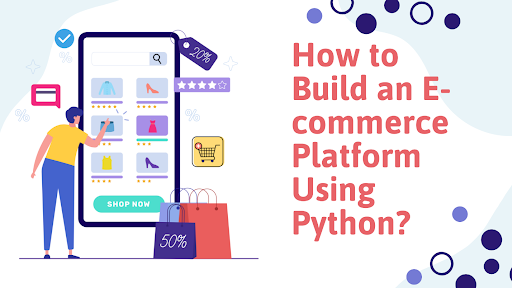
How to Build an E-commerce Platform Using Python?
Learn how to build an e-commerce platform using Python. Explore the best frameworks, essential features & tools for a secure online store.

Learn how to build an e-commerce platform using Python. Explore the best frameworks, essential features & tools for a secure online store.
Are you looking for an e-commerce platform to expand your online presence? If yes, then a popular choice for developing e-commerce platforms is using python. It has robust frameworks, versatility, and good library support. Whether you’re a startup or an established business, python development provides an efficient and scalable way to build an online store.
Different aspects of python have contributed to its popularity. Here, we will explore the important features and tools needed when building an e-commerce platform using python. By outsourcing your e-commerce platform to a Python development company, all you’ll have to do is check for the features and tools available in this guide.
Python frameworks and libraries make it simpler for you to incorporate the following essential features in an ecommerce platform:
An efficient product management system is essential which enables businesses to add, update, and remove products with ease. Python frameworks like Flask and Django provide database management capabilities to handle large inventories.
A secure authentication system is very important for data protection. Python’s Django framework comes with a built-in authentication system that allows secure user login and registration.
A seamless shopping cart experience helps to improve customer satisfaction. Python libraries like Osacr and Saleor provide built-in functionalities for cart management and a simple checkout system.
It’s important that the payment gateway you integrate in your ecommerce website or app is secure and functions smoothly at all times. Stripe, PayPal, and RazorPay are some popular choices for this reason. Python has a good set of APIs and libraries that can facilitate easy integration of multiple payment methods.
An efficient order management system helps to track customer orders, which include both shipping and return details. Django’s ORM (Object-Relational Mapper) helps to ease the database interactions for order managers in an efficient manner.
Searching for products through filters like price, category, and reviews makes shopping experience simpler and faster for users. Elasticsearch and Whoosh are python-based libraries enabling fast and efficient search functionality.
As there is a tremendous increase in mobile commerce, it is essential to ensure that your e-commerce platform is mobile-friendly. Python frameworks like Django support seamless mobile integration and responsive design.
To increase visibility on search engines, there are some ranking factors every site needs to fulfill. Django has good SEO-friendly features, like customizable URLs and meta tags, which help to improve rankings.
In the above section, we discovered that adding ecommerce features to an app or website is more convenient with certain frameworks and libraries based on python. To highlight a few, following are the best frameworks you can use for ecommerce development with python:
Django has built-in features for incorporating strong security and authentication that are very important for an ecommerce platform. It also has great tools for database management. If you want to build a large-scale e-commerce platform, then Django is a better choice.
Flask is a flexible and lightweight framework that allows developers to build customized e-commerce applications in a simple way.
Saleor is an open-source e-commerce framework built on Django. It has many pre-built functionalities for payment processing, managing inventories, and updating order details.
Oscar is a Django-based e-commerce framework that supports complex product management and custom checkout flows.
For businesses that want to integrate with WooCommerce, python is a better option as it provides libraries to interact with its API. Thus, it helps in better store management.
Python frameworks have certainly made ecommerce development simpler and more efficient. It is a popular choice among developers. Hence, all you need is an e-commerce development company with the best team of python programmers at your disposal.

Web Development Services in the United States